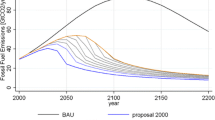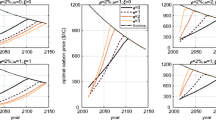Abstract
Tol (2003) questioned the applicability of expected cost-benefit analysis to global mitigation policy when he found evidence that the uncertainty surrounding estimates of the marginal damage of climate change could be infinite even if total damages were finite. Yohe (2003) suggested that this problem could be alleviated if international development aid were directed at eliminating the source of the problem – climate induced negative growth rates in a few regions along a handful of troublesome scenarios. The hypothesis about adding a second policy lever to the climate policy calculus is shown to hold, though perhaps not as robustly as originally thought. A portfolio of international policies with at least two independent tools can avoid infinite uncertainty on the margins and the associated implications for global mitigation policy at a reasonable price even in the relatively unlikely event that climate change causes negative economic growth in a region or two.
Similar content being viewed by others
References
Azar C, Lindgren K (2003) Catastrophic events and stochastic cost-benefit analysis of climate change. Clim Change 56:245–255
Batjes JJ, Goldewijk CGM (1994) The IMAGE 2 hundred year (1890–1990) database of the global environment (HYDE). RIVM, Bilthoven, 410100082
Bruckner T, Petschel-Held G, Leimbach M, Toth FL (2003) Methodological aspects of the tolerable windows approach. Clim Change 56(1):73–89
Cline WR (1992) The economics of global warming. Institute for International Economics, Washington, DC
Easterly W (2002) The elusive quest for growth – economists’ adventures and misadventures in the tropics. The MIT Press, Cambridge, MA
Fankhauser S (1994) Protection vs. retreat – the economic costs of sea level rise. Environ Plann A 27:299–319
Fankhauser S, Tol RSJ (2005) On climate change and economic growth. Resour Energy Econ 27:1–17
Fankhauser S, Tol RSJ, Pearce DW (1997) The aggregation of climate change damages: a welfare theoretic approach. Environ Resour Econ 10:249–266
Gerlagh R (2006) The level and distribution of costs and benefits over generations of an emission stabilization program. Energy Econ 29(1):126–131
Hammitt JK, Lempert RJ, Schlesinger ME (1992) A sequential-decision strategy for abating climate change. Nature 357:315–318
Howarth RB (2003) Catastrophic outcomes in the economics of climate change. Clim Change 56:257–263
Kavuncu YO, Knabb SD (2005) Stabilizing greenhouse gas emissions: assessing the intergenerational costs and benefits of the Kyoto protocol. Energy Econ 27(3):369–386
Kattenberg A, Giorgi F, Grassl H, Meehl GA, Mitchell JFB, Stouffer RJ, Tokioka T, Weaver AJ, Wigley TML (1996) Climate models – projections of future climate. In: Houghton JT et al (eds) Climate change 1995: the science of climate change and contribution of working group I to the second assessment report of the intergovernmental panel on climate change, 1st edn. Cambridge University Press, Cambridge, pp 285–357
Leggett J, Pepper WJ, Swart RJ (1992) Emissions scenarios for the IPCC: an update. In: Houghton JT, Callander BA, Varney SK (eds) Climate change 1992 – the supplementary report to the IPCC scientific assessment, vol. 1, 1st edn. Cambridge University Press, Cambridge, pp 71–95
Link PM, Tol RSJ (2004) Possible economic impacts of a shutdown of the thermohaline circulation: an application of FUND. Portuguese Economic Journal 3:99–114
Maier-Reimer E, Hasselmann K (1987) Transport and storage of carbon dioxide in the ocean: an inorganic ocean circulation carbon cycle model. Clim Dyn 2:63–90
Mendelsohn R, Morrison W, Schlesinger ME, Andronova NG (2000) Country-specific market impacts of climate change. Clim Change 45:553–569
Nordhaus WD (2007) Alternative measures of output in global economic-environmental models: purchasing power parity or market exchange rates? Energy Econ 29(3):349–372
Persky J (2001) Retrospectives: cost-benefit analysis and the classical creed. J Econ Perspect 15(4):199–208
Pratt JW, Raiffa H, Schlaifer R (1995) Introduction to statistical decision theory. The MIT Press, Cambridge, MA
Shine KP, Derwent RG, Wuebbles DJ, Morcrette J-J (1990) Radiative forcing of climate. In: Houghton JT, Jenkins GJ, Ephraums JJ (eds) Climate change – the IPCC scientific assessment, vol. 1, 1st edn. Cambridge University Press, Cambridge, pp 41–68
Tol RSJ (1995) The damage costs of climate change toward more comprehensive calculations. Environ Resour Econ 5:353–374
Tol RSJ (1996) The damage costs of climate change towards a dynamic representation. Ecol Econ 19:67–90
Tol RSJ (1999) Spatial and temporal efficiency in climate policy: applications of FUND. Environ Resour Econ 14(1):33–49
Tol RSJ (2001) Equitable cost-benefit analysis of climate change. Ecol Econ 36(1):71–85
Tol RSJ (2002a) Welfare specification and optimal control of climate change: an application of FUND. Energy Econ 24(4):367–376
Tol RSJ (2002b) New estimates of the damage costs of climate change, part I: benchmark estimates. Environ Resour Econ 21(1):47–73
Tol RSJ (2002c) New estimates of the damage costs of climate change, part II: dynamic estimates. Environ Resour Econ 21(1):135–160
Tol RSJ (2003) Is the uncertainty about climate change too large for expected cost-benefit analysis? Clim Change 56:265–289
Tol RSJ (2006a) Multi-gas emission reduction for climate change policy: an application of FUND. Energy J (Multi-Greenhouse Gas Mitigation and Climate Policy Special Issue):235–250
Tol RSJ (2006b) Exchange rates and climate change: an application of FUND. Clim Change 75:59–80
Tol RSJ, Yohe GW (2006) Of dangerous climate change and dangerous emission reduction. In: Schellnhuber HJ, Cramer W, Nakicenovic N, Wigley T, Yohe G (eds) Avoiding dangerous climate change, chapter 30. Cambridge University Press, Cambridge, pp 291–298
WRI (2000) World resources database 2000–2001. World Resources Institute, Washington, DC
Yohe GW (2003) More trouble for cost-benefit analysis. Clim Change 56:235–244
Yohe GW, Schlesinger ME, Andronova NG (2004) To hedge or not against an uncertain climate future? Science 306:416–417
Author information
Authors and Affiliations
Corresponding author
Electronic supplementary material
Below is the link to the electronic supplementary material.
ESM 1
The climate framework for uncertainty, negotiation and distribution (FUND), technical description, version 2.8 (DOC 225 kb)
ESM Tables
(DOC 3.45 mb)
Rights and permissions
About this article
Cite this article
Tol, R.S.J., Yohe, G.W. Infinite uncertainty, forgotten feedbacks, and cost-benefit analysis of climate policy. Climatic Change 83, 429–442 (2007). https://doi.org/10.1007/s10584-007-9258-z
Received:
Accepted:
Published:
Issue Date:
DOI: https://doi.org/10.1007/s10584-007-9258-z




